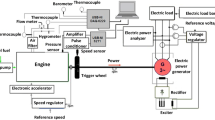
Overview
- Maximizes readers’ understanding of the construction, working principles, installation, signal processing and limitations of the transducers used for combustion analysis
- Provides a range of different models for estimating heat release and heat transfer for combustion quality analysis
- Describes statistical and chaotic methods used for combustion stability analysis and the different knock indices and combustion noise metrics evaluated from cylinder pressure signal
- Reinforces concepts presented with end of chapter summary discussions and questions
- Explains methods used for estimation of engine parameters such as TDC, compression ratio, air-fuel ratio, residual gas fraction and wall temperature using in-cylinder pressure measurement
Part of the book series: Mechanical Engineering Series (MES)
Buy print copy
About this book
This book deals with in-cylinder pressure measurement and its post-processing for combustion quality analysis of conventional and advanced reciprocating engines. It offers insight into knocking and combustion stability analysis techniques and algorithms in SI, CI, and LTC engines, and places special emphasis on the digital signal processing of in-cylinder pressure signal for online and offline applications. The text gives a detailed description on sensors for combustion measurement, data acquisition, and methods for estimation of performance and combustion parameters. The information provided in this book enhances readers’ basic knowledge of engine combustion diagnostics and serves as a comprehensive, ready reference for a broad audience including graduate students, course instructors, researchers, and practicing engineers in the automotive, oil and other industries concerned with internal combustion engines.
Similar content being viewed by others
Keywords
Table of contents (10 chapters)
-
Front Matter
-
Back Matter
Authors and Affiliations
About the author
Dr. Rakesh Kumar Maurya has been a faculty member in the Department of Mechanical Engineering, Indian Institute of Technology Ropar since August 2013. Before joining IIT Ropar, he was working as Senior Research Associate (Pool Scientist-CSIR) at IIT Kanpur. He received his bachelor’s, master’s and Ph.D. degrees in Mechanical Engineering from Indian Institute of Technology Kanpur, India. He received the Early Career Research Award from Science and Engineering Research Board (SERB), Government of India, New Delhi. He is also a recipient of Young Scientist Award (2016) from International Society for Energy, Environment and Sustainability. He is the author of the book titled Characteristics and Control of Low Temperature Combustion Engines: Employing Gasoline, Ethanol and Methanol published by Springer International Publishing AG in 2018. He has also edited one book published by Springer and published 15 book chapters and more than 40 international peer-reviewed journal papers. He teaches and conducts research in the area of internal combustion engines. His areas of interest are low-temperature engine combustion, alternative fuels, engine combustion diagnostics, engine instrumentation, combustion and emission control, particulate matter characterization, engine management systems, engineering ethics and philosophy of science.
Bibliographic Information
Book Title: Reciprocating Engine Combustion Diagnostics
Book Subtitle: In-Cylinder Pressure Measurement and Analysis
Authors: Rakesh Kumar Maurya
Series Title: Mechanical Engineering Series
DOI: https://doi.org/10.1007/978-3-030-11954-6
Publisher: Springer Cham
eBook Packages: Engineering, Engineering (R0)
Copyright Information: Springer Nature Switzerland AG 2019
Hardcover ISBN: 978-3-030-11953-9Published: 27 March 2019
Softcover ISBN: 978-3-030-11956-0Published: 14 August 2020
eBook ISBN: 978-3-030-11954-6Published: 19 March 2019
Series ISSN: 0941-5122
Series E-ISSN: 2192-063X
Edition Number: 1
Number of Pages: XV, 616
Number of Illustrations: 46 b/w illustrations, 344 illustrations in colour
Topics: Engine Technology, Automotive Engineering, Engineering Thermodynamics, Heat and Mass Transfer, Fossil Fuels (incl. Carbon Capture)



